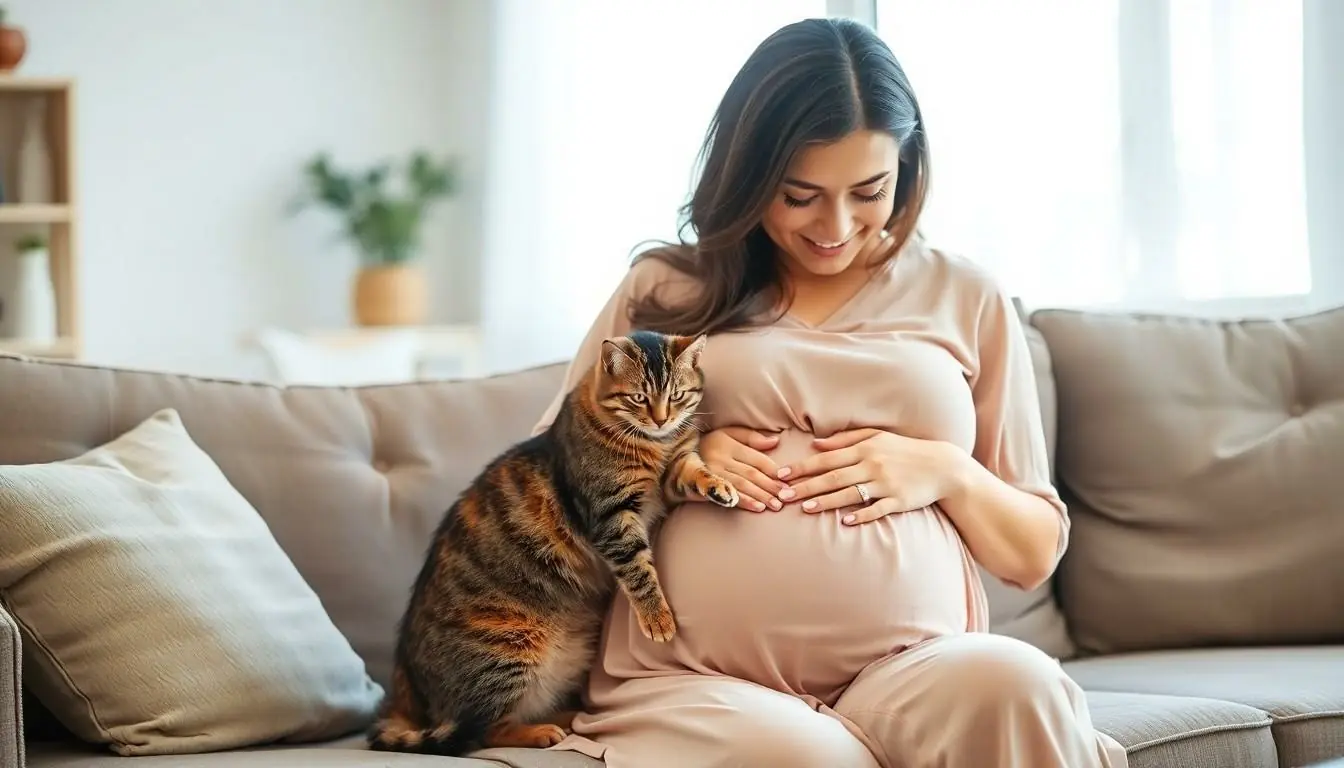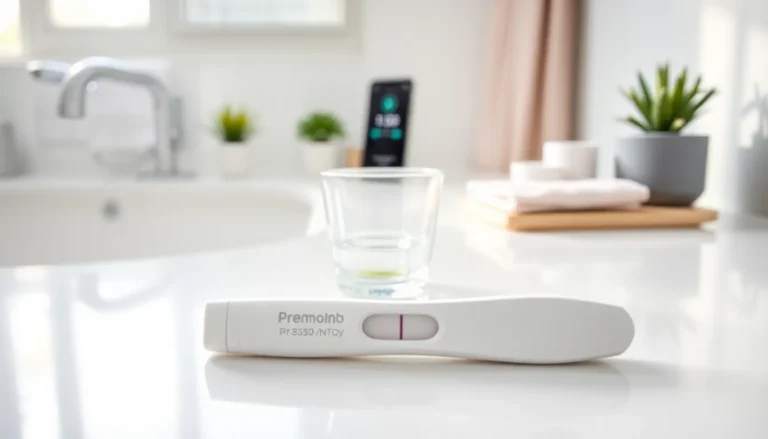Cats have a knack for sensing things that humans often overlook. With their keen instincts and mysterious ways, many pet owners wonder if their feline friends can detect pregnancy. Imagine your cat suddenly becoming more clingy or protective, as if they know something’s about to change. It’s like having a furry psychic in your home.
While it may sound like a plot twist from a quirky rom-com, the idea that cats can sense pregnancy isn’t just a whimsical notion. Their heightened senses and ability to pick up on subtle changes in their environment make them surprisingly attuned to their humans. So, what gives? Let’s dive into the fascinating world of feline intuition and explore whether your cat really can sense the pitter-patter of tiny feet on the way.
Table of Contents
ToggleUnderstanding Cats’ Senses
Cats possess exceptional sensory abilities that allow them to perceive subtle changes in their environment. These senses play a crucial role in their behavior, particularly when they sense a significant change like pregnancy.
The Sense of Smell
Cats rely heavily on their sense of smell, which is approximately 14 times stronger than that of humans. This heightened olfactory ability enables them to detect hormonal changes in pregnant individuals. Fluctuations in pheromones and scents can signal a shift in the human’s condition. Pregnant women often emit different scents due to hormonal variations. As a result, a cat may exhibit increased attachment or interest in the pregnant individual. Changes in routine also produce olfactory signals that cats can recognize, enhancing their awareness of new family dynamics.
The Sense of Hearing
Cats’ acute sense of hearing allows them to perceive sounds at higher frequencies than humans. Their hearing range extends from 48 Hz to 85 kHz, compared to the human range of 20 Hz to 20 kHz. This sensitivity to sound means that cats can hear subtle changes in one’s vocal tone and body language during pregnancy. Unusual patterns in a human’s voice or movements often draw a cat’s attention. Additionally, detecting the sound of a heartbeat or even the movements of a developing fetus might prompt changes in the cat’s behavior. Such reactions can include increased vigilance or curiosity about the pregnant person’s condition.
Behavioral Changes in Cats
Cats exhibit notable behavioral changes in response to their owner’s pregnancy. Increased sensitivity to human emotions often marks this period.
Response to Human Emotions
Cats can sense shifts in their owner’s emotional state. They may become more affectionate or clingy during pregnancy. Aggressive or hyperactive behaviors can indicate anxiety in the human. Moreover, many cats can discern stress due to hormonal fluctuations. They might respond by providing comfort through physical closeness or seeking out their owners more frequently. This behavior fosters a deeper connection, reflecting the cat’s sensitivity to the emotional landscape surrounding them.
Changes in Interaction with Pregnant Owners
Interaction dynamics can shift significantly with pregnant owners. Cats may display curiosity toward the growing belly, often nuzzling or sitting close. Some might adjust their sleeping patterns, opting to be near their owners more often. Changes in play behavior can arise, such as the cat playing gently or avoiding certain activities altogether. They might also demonstrate protective tendencies, positioning themselves between the owner and perceived threats. These adaptations highlight the cat’s instinctive responses to the unique circumstances of pregnancy.
Evidence Supporting Cats Sensing Pregnancy
Cats exhibit a remarkable sensitivity to changes during pregnancy. This behavior manifests through various anecdotes and scientific studies.
Anecdotal Reports
Many cat owners report noticeable changes in their pets’ behavior during their pregnancies. Increased clinginess often appears, with cats seeking proximity to their owners more than usual. Some cats demonstrate protective instincts, positioning themselves near their pregnant owners or gently resting on their bellies. Owners frequently observe their cats becoming more vocal, which correlates with shifts in human emotions. These personal accounts suggest that cats have an innate ability to sense shifts in their environment, including hormonal changes linked to pregnancy.
Scientific Studies
Research supports the notion that cats can detect hormonal changes during pregnancy. A study indicated that cats possess an extraordinary sense of smell, detecting pheromones and hormonal shifts associated with gestation. Cats’ acute hearing also plays a role, allowing them to pick up changes in their owners’ vocal tones, especially when emotions fluctuate. Another study highlighted behavioral changes in cats that align with the presence of new family dynamics, indicating that cats adapt to their owners’ conditions. This combination of sensory perception and behavioral adaptation presents compelling evidence for cats sensing pregnancy.
Factors Influencing Cats’ Perception
Cats’ ability to sense pregnancy can vary based on several factors. These include breed-specific traits and environmental influences that shape their perceptions.
Breed Specific Traits
Different cat breeds exhibit unique sensory capabilities. Breeds like Siamese or Burmese, known for their high intelligence, often respond more acutely to changes in their owners. These breeds display enhanced social instincts and may become exceptionally affectionate during pregnancy. In contrast, more independent breeds, such as the Russian Blue, might show less noticeable behavior changes. Variations in temperament and socialization also play a role in how each breed reacts to their owner’s condition.
Environmental Factors
The home environment significantly impacts a cat’s perception of pregnancy. Changes in routine, such as increased movement or altered scents, can heighten a cat’s awareness. Familiar sounds, like soft voices or new baby gear, may trigger curiosity or concern. Overall, the atmosphere created by an owner’s emotions during pregnancy influences a cat’s behavior. Relaxed surroundings often lead to more affectionate responses, while heightened tension may result in anxiety-driven behaviors. Adapting the environment can help maintain a calm atmosphere for both the owner and the cat.
Conclusion
Cats possess remarkable sensory abilities that allow them to pick up on the subtle changes associated with pregnancy. Their heightened sense of smell and acute hearing enable them to detect hormonal shifts and emotional states in their human companions. As a result, many cat owners notice significant behavioral changes in their pets during this time.
Whether it’s increased affection or protective instincts these behaviors reflect a deep bond between cats and their owners. Understanding these responses can enhance the experience of pregnancy for both the cat and the expectant parent. Ultimately, cats not only sense pregnancy but also adapt their behavior in ways that highlight their unique connection to humans.



